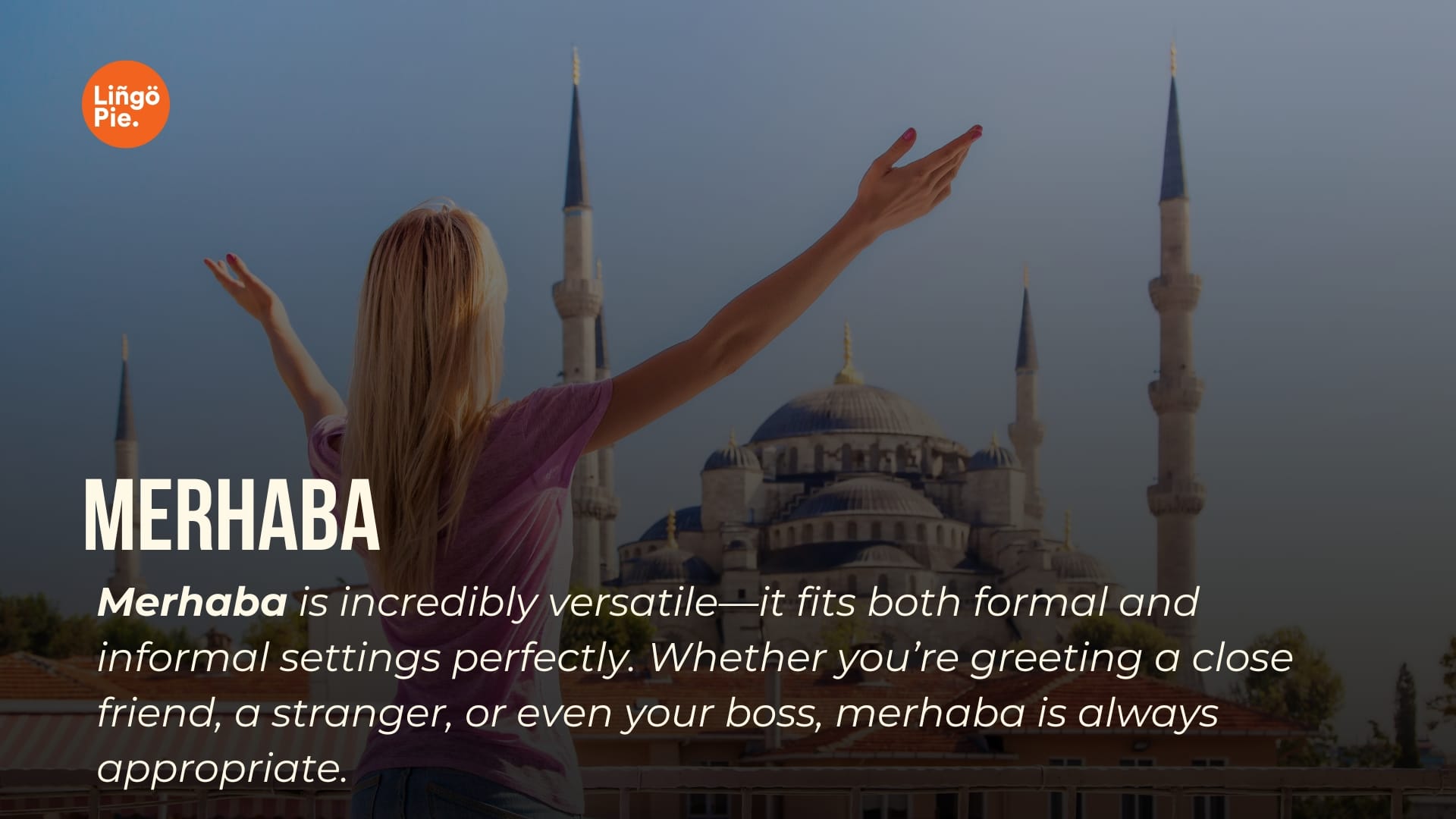As a Native I can say Turkish, with its melodic flow and warm expressions, is a language full of charm and cultural depth. Saying hello in Turkish is more than just a greeting; it's an invitation into a culture known for its hospitality and kindness.
Let’s learn all the ways you can say hello in Turkish and take your first step into this beautiful language.
- How To Say Thank You In Turkish?
- Gaming Terms In Turkish
- Curse Words In Turkish

How To Say Hello In Turkish?

When you think of Turkish greetings, merhaba is likely the first word that comes to mind. It’s the most well-known and widely used way to say hello in Turkish, and for good reason.
Merhaba is incredibly versatile—it fits both formal and informal settings perfectly. Whether you’re greeting a close friend, a stranger, or even your boss, merhaba is always appropriate.
Hello In Turkish For Different Times Of The Day
In Turkish, there are specific greetings for different times of day, adding a touch of warmth and personal connection to each moment. These time-specific greetings are a simple yet thoughtful way to express good intentions throughout the day. Here are the key ones:
Günaydın (Good Morning)
This greeting is used in the early hours, typically until noon. Its literal meaning, "The day is bright," reflects the optimistic tone of greeting someone at the start of a new day. It's the perfect way to wish someone a bright, energetic morning.
Tünaydın (Good Afternoon)
This greeting is a bit more unusual in its meaning—it translates to "The night is bright." It's used in the afternoon, right around the time when the sun begins its descent. While it may sound odd at first, it’s a charming way to acknowledge the shift from morning to afternoon.
İyi Günler (Good Day)
This phrase is used from noon until evening. It can also serve as a farewell, making it a handy expression to remember. Whether you're wishing someone a pleasant day ahead or bidding them goodbye, iyi günler works seamlessly in both contexts.
İyi Akşamlar (Good Evening)
Used after sunset, this greeting conveys warmth and politeness as the day transitions into night. Much like iyi günler, iyi akşamlar can also function as a farewell, wishing someone a pleasant evening or a peaceful end to their day.
Read Also:

Casual Phrases For Hello In Turkish
When you're with close friends or people your age, Turkish greetings become more relaxed and informal. Here are some fun and common ways to say hello to your friends:
Selam (Greetings)
This is a go-to greeting among friends and peers. It’s similar to saying “Hey” or “Hi” in English. Casual, friendly, and easy to use, selam is the perfect way to start a conversation in a laid-back setting.
Naber? (How’s it going?)
This phrase is the Turkish equivalent of “What’s up?” or “How’s it going?” in English. It's an informal, fun way to check in with someone, usually followed by a friendly conversation.
You can respond to this question with these phrases:
- İyilik, senden? (Good, and you?): The most common response, meaning "I'm good, and you?"
- Ne olsun, aynı. (Nothing much): A very informal response, somewhat like saying "Nothing much" or "Same as usual."
- İyi diyelim, iyi olalım. (Let’s say well so that things go well): A bit poetic, this phrase translates to "Let’s say ‘well’ so things will go well" and shows a more positive outlook on life.
- Aynı tas aynı hamam. (Same as always): This phrase literally means “Same bowl, same hammam” and is used when you want to express that things are the same as before. If you’re feeling neutral or even a bit down, this is the way to go.
These casual greetings add a fun, personal touch to conversations with friends, making Turkish interactions feel warm and approachable.

Hello In Turkish In The Islamic Context
In Turkish culture, religious greetings hold significant cultural meaning, and Selâmün aleyküm is one of the most important. Derived from Arabic, this greeting translates to “Peace be upon you,” and is used widely across the Muslim world, including in Turkey.
Selâmün Aleyküm (Peace Be Upon You)
This greeting is commonly used among religious Muslim Turks and reflects a deep sense of respect and peace. It is often exchanged among family members, friends, or even strangers as a sign of goodwill.
If you are also a Muslim foreigner, you can respond with this phrase:
Aleyküm Selam (And peace be upon you): The proper response to selâmün aleyküm is aleyküm selam, which means "And peace be upon you." This polite and respectful exchange is integral to the Turkish way of acknowledging others in the Islamic context.
It’s important to note that, even if you’re not religious, returning the greeting is a sign of respect and politeness in Turkish culture. The phrase is so embedded in everyday interactions that it’s often used regardless of one’s personal beliefs.
Read Also:

Hello In Turkish For Welcoming Guests
Hospitality is at the heart of Turkish culture, and it’s essential to know how to greet guests properly. Turkish people take pride in welcoming visitors with open arms, whether at home or in business settings. Here’s how to greet someone when they arrive:
Hoş Geldin (Welcome)
This is used when greeting one person you’re familiar with, such as a close friend or family member. It's the Turkish equivalent of saying "Welcome" in English and is a warm, inviting way to show hospitality.
Hoş Geldiniz (Welcome)
If you're greeting multiple people or someone with whom you have a more formal relationship, "hoş geldiniz" is the appropriate form. It adds a layer of politeness and respect, making it a go-to phrase for any occasion where guests are involved.
When someone greets you with hoş geldin or hoş geldiniz, the correct response is hoş bulduk. This expression, which literally means "We found it well," reflects the idea of feeling at ease and comfortable in the host’s home or environment. There’s no direct equivalent to this in English, so it’s best to just memorize it as part of Turkish hospitality etiquette.
Hello In Turkish For The Workplace
In Turkey, workplace greetings are often infused with warmth and a touch of encouragement. One unique and widely used greeting is:
Kolay gelsin (May It Be Easy):
This greeting is distinctively Turkish and is used to wish someone ease in their work. It’s often exchanged when seeing someone working, whether it's a colleague, shop assistant, or even someone performing a task in public. It’s like saying, “Good luck with your work,” or “I hope things go smoothly for you.”
You can use kolay gelsin as a standalone greeting, or you can combine it with other common greetings like günaydın, for example:
- Günaydın. Kolay gelsin! (Good morning. I hope your work goes smoothly!)
This phrase isn’t limited to just greetings—it’s also commonly used as a way to say goodbye. So, whether you’re just arriving at work or leaving at the end of the day, kolay gelsin expresses a thoughtful wish for the person’s workday to be easy.
Get Ready To Learn Turkish With Lingopie!
Ready to go beyond hellos in Turkish? Well, good news! Turkish is available in Lingopie! If you've been eager to learn Turkish in an immersive, fun way, this is your chance. Lingopie offers a unique language-learning experience by using engaging content like native TV shows and movies, making it a natural and enjoyable way to learn.
Through Lingopie, you can watch Turkish content with subtitles, allowing you to learn new Turkish phrases, expressions, and cultural nuances as you watch. It’s like combining entertainment with education, helping you retain what you learn and improve your language skills in a way that’s both easy and effective.
So, whether you’re a beginner or looking to refine your skills, stay tuned for updates on when Turkish content will be available. Don’t miss out on this incredible opportunity to learn Turkish the fun way—sign up for Lingopie!
Frequently Asked Questions About Hello In Turkish
1. How do you greet someone in Turkish?
The most common way to greet someone in Turkish is by saying "Merhaba" (Hello). You can use it in almost any situation, whether formal or informal.
2. Is it Salam or Merhaba?
Merhaba is the standard greeting in Turkish. Selam (a variation of "Salam") is more casual and is typically used among friends.
3. Is it Merhaba or Selam?
Both are used in Turkish, but Merhaba is more formal and universal, while Selam is informal and commonly used with friends.
4. Is Merhaba polite?
Yes, Merhaba is polite and appropriate for most situations. It’s a safe and respectful way to greet anyone.





![Telling Time In Korean: A Guide For Total Beginners [2026]](/blog/content/images/2025/04/Telling-Time-in-Korean--3-.jpg)




